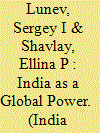| Srl | Item |
| 1 |
ID:
182606


|
|
|
|
|
| Summary/Abstract |
The article reviews India’s contested role of a great power in global politics. Although showing tangible results across all the aspects pertaining to the great power status, in international relations India is still largely underestimated and even overlooked. Politicians and scholars generally mention three main reasons behind that phenomenon: weak social and economic figures, the country’s relatively narrow global impact and the absence of strategic culture. We argue that the latter is key, and that it is in the process of being remedied. In fact, India already has all the prerequisites for being recognised as a ‘great power’, since it has political, military, economic and cultural capabilities corresponding to the status. It is simply a matter of time and coordinated efforts of the government to formulate and implement a consistent foreign policy and economic strategy as well as a change in Indian elite’s strategic thinking which will enable untapping India’s existing potential and successfully meeting the objective of increasing its influence in global politics.
|
|
|
|
|
|
|
|
|
|
|
|
|
|
|
|
| 2 |
ID:
178806


|
|
|
|
|
| Summary/Abstract |
The paper discusses the prerequisites for the emergence of the Indo-
Pacific region, or Indo-Pacific, as a conceptual term to denote a new vast
geostrategic space that embraces closely connected countries facing similar
challenges. To this end, the article analyzes geopolitical transformations
that have brought about a change in the conceptualization of this macro-
region and India’s foreign policy strategy. The paper provides an overview of
neorealist and constructivist approaches characteristic of Moscow and New
Delhi, respectively. The paper argues that today Russia’s involvement in the
region is limited and by focusing on the Asia-Pacific Russia overlooks the vistas of closer relations with India. Russia could gain more if it changes its
perception of the Indo-Pacific as an American concept and takes a different,
constructivist approach. By ignoring new realities Russia deprives itself of
additional opportunities in Asia, which is especially important in view of its
general turn to the East and amid unceasing confrontation with the West.
|
|
|
|
|
|
|
|
|
|
|
|
|
|
|
|